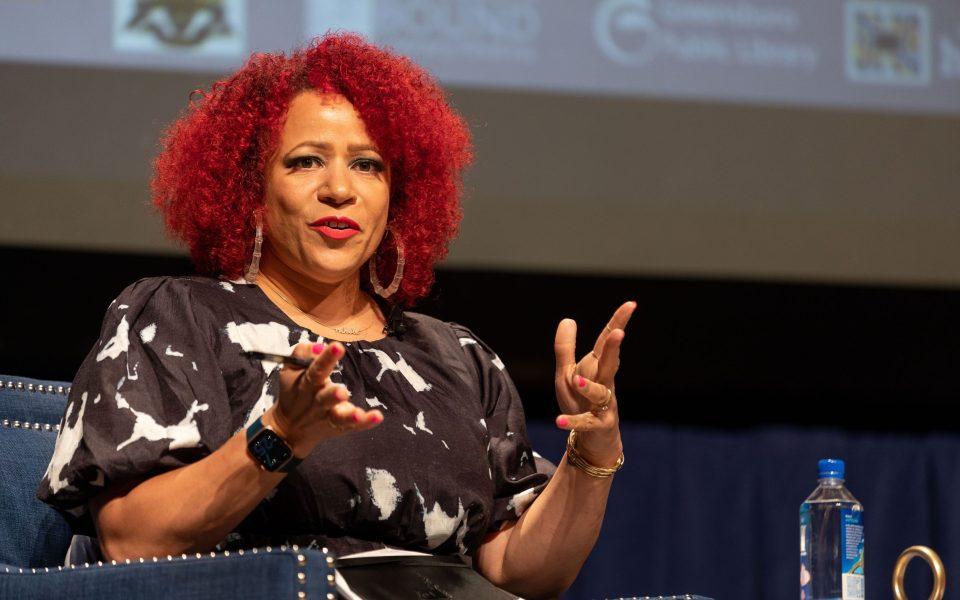Nikole Hannah-Jones has been busy.
The award-winning investigative journalist spoke at Harrison Auditorium at NC A&T State University on May 21 to conclude a redlining discussion series hosted by FD Bluford Library, made possible by a grant from North Carolina Humanities. The talk also took place in conjunction with the Greensboro Bound Literary Festival.
R&B instrumentals played through the speakers as the auditorium filled with excited chatter from attendees waiting for the program to begin. At the entrance of Harrison were copies of Hannah-Jones’ The 1619 Project available for purchase. Just outside, an excited couple posed for a selfie with their copy. On the stage were two blue chairs placed about three feet apart, a distance possibly representing the familiarity of the conversation about to take place.

Hannah-Jones is currently a domestic correspondent for New York Times Magazine, specializing in racial injustice. In partnership with journalists Ron Nixon, Corey Johnson and Topher Sanders, Hannah-Jones founded the Ida B. Wells Society for Investigative Reporting in Memphis, TN, in 2016. The organization aims to increase and retain the number of minority investigative journalists in the industry while seeking to “educate news organizations and journalists on how the inclusion of diverse voices can raise the caliber, impact and visibility of investigative journalism as a means of promoting transparency and good government.”
In 2020, Hannah-Jones won the Pulitzer Prize for Commentary for her introductory essay to The 1619 Project: A New Origin Story, a collection of essays, poems and works of fiction written by Hannah-Jones and other authors that suggests the history of the United States is not only defined by the signing of the Declaration of Independence in 1776, but also by the arrival of the White Lion ship carrying enslaved African people to a British colony in 1619.

In April 2021, it was announced that Hannah-Jones would join the UNC Hussman School of Journalism and Media in July as the Knight Chair in Race and Journalism, a move criticized by conservative groups, educators and others that opposed statements made in the 1619 Project. As the University Board of Trustees was supposed to approve her application for tenure, pushback from critics caused the Board to succumb to the pressure and stall, an action revealed in an article published by NC Policy Watch. UNC offered a five-year contract with an option for tenure review as they could not offer tenure without approval from the Board.
After some members of Hussman pointed out the unfairness in Hannah-Jones’ offer as previous Chairs had been offered tenure, UNC finally offered Hannah-Jones tenure in June, but she declined and accepted a position as a tenured member of Howard University’s Cathy Hughes School of Communications instead.
“I cannot imagine working at and advancing a school named for a man who lobbied against me, who used his wealth to influence the hires and ideology of the journalism school, who ignored my 20 years of journalism experience, all of my credentials, all of my work, because he believed that a project that centered Black Americans equaled the denigration of white Americans. Nor can I work at an institution whose leadership permitted this conduct and has done nothing to disavow it,” Hannah-Jones said in a statement on July 6, 2021.
On May 21, Hannah-Jones, joined on stage by moderator Dr. Kim T. Chavis, Director of Title III programs at A&T, began the evening by giving a humorous recount of how her family ended up in Waterloo, Iowa. During the Great Migration — her grandmother and her children, one being Hannah-Jones’ father — took the Illinois Central Railroad north from Mississippi.
“Where they left was so country, they got to Waterloo and thought they hit the big city,” Hannah-Jones said.
She continued, “We didn’t make it all the way to Chicago with the rest of the Black folks.”

Her curious, investigative nature began as she entered a voluntary school desegregation program in second grade. During the ride to school, she noticed an immediate change in her environment as the bus approached the Cedar River.
“I started to study the literal landscape of inequality from the school bus window,” she said.
“As we got closer to the river that divided the east side from the west side, everything got nicer. There were more places to shop, more places to dine, the houses looked nicer.”
Hannah-Jones began to question why that was.
“I was a very nerdy child; I know that’s hard to believe because I’m fabulous now,” she said in jest, referring to her black-and-white print dress that stopped just above the knee, wedge sandals and bold red lipstick that matched her bright-red, curly hair.
Redlining is the illegal practice of denying home loans or restricting services to certain communities, typically due to discrimination based on the race of the applicant’s neighborhood.
Hannah-Jones became a journalist to research and expose racial inequality, especially as it pertains to the practice of redlining houses and schools. She grew up in a redlined community and faced even more exposure to it after covering Durham Public Schools for the News & Observer in Raleigh in 2003. From there, she moved to Portland, Ore. to write for The Oregonian, which surprised Chavis.
“From Durham to Oregon?” he questioned.
“You know, I actually told myself growing up in Iowa, I would never live in a state that white again and I ended up in Oregon,” Hannah-Jones responded jokingly.
While working there covering county government, she became aware of fair-housing testing the city had done. They ended up finding that Black tenants were discriminated against when trying to rent properties, so Hannah-Jones contacted the city inquiring about a resolution against discriminatory landlords.
“They put me on hold,” she said. “Then they came back and said, ‘We aren’t actually doing anything. We were just testing to see what was out there.’”

Hannah-Jones and Chavis discussed how physical structures like buildings or train tracks are sometimes put in place to separate the Black and white sides of towns. Chavis questioned the ways banks contribute to redlining houses and schools, to which Hannah-Jones was happy to answer.
“We have to set the table that redlining was created by the federal government,” she said. “Redlining was not created by banks.”
She went on to explain how during the Great Depression, the federal government believed it needed to intervene in the economy and build a middle class.
“In the 1930s, middle class meant ‘white,’” she said.
She chronicled the federal government’s housing administration that insured home loans. On a map of the city, a red marker or pen was used to mark off Black, immigrant and integrated neighborhoods as these areas were considered too “toxic” to insure, the effects of which are still seen today.
As Hannah-Jones spoke throughout the evening, the near sold-out crowd took in every word the journalist spoke. And despite the recent controversy, her reason for working as a journalist stays the same.
“I was a kid with a lot of questions society couldn’t answer,” Hannah-Jones said.
Now, she answers them herself.
Find more information about Nikole Hannah-Jones at nikolehannahjones.com. Learn more about The 1619 Project: The 1619 Project: A New Origin Story at 1619books.com. More information about the Ida B. Wells Society for Investigative Reporting can be found at idabwellssociety.org.
Join the First Amendment Society, a membership that goes directly to funding TCB‘s newsroom.
We believe that reporting can save the world.
The TCB First Amendment Society recognizes the vital role of a free, unfettered press with a bundling of local experiences designed to build community, and unique engagements with our newsroom that will help you understand, and shape, local journalism’s critical role in uplifting the people in our cities.
All revenue goes directly into the newsroom as reporters’ salaries and freelance commissions.


Ms. Ratliff does a wonderful job contextualizing Ms. Hannah-Jones recent appearance at N.C. A&T. Thank you for artfully sharing Hannah-Jones’s backstory, especially the controversy involving the denial of tenure by the UNC Board of Governors. The 1619 Project is American history and should be taught in every public school as just that — history. Well done, Michaela! Keep up the great work!